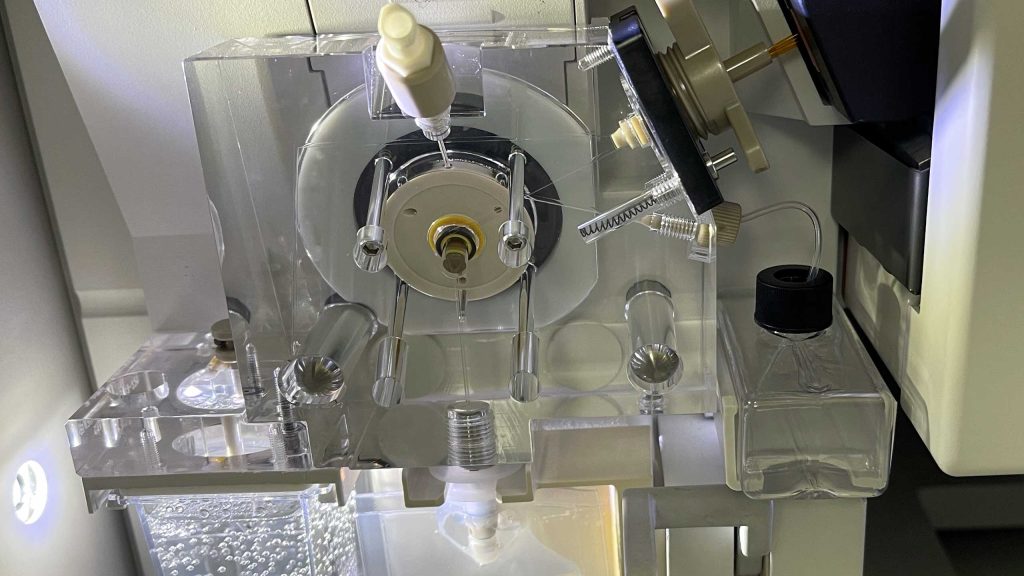Jump To:
Plan | Process | Program | Resources | Video | Inquiry Form
Over the past 10 to 15 years, targeted agents have become a fundamental part of cancer therapeutic decision-making. Predictive tumor profiling assays are the cornerstone of today’s cancer care. Diagnostic Laboratory Services, Inc. (DLS) now offers comprehensive tumor profiling to assist your oncologist in planning your cancer treatment. Ask your physician about how you can integrate these advanced services into your treatment plan.
Plan
We can help you and your oncologist with a plan.
There has been a superior improvement in the overall survival of patients where there is a molecular target identified.
The Next-Generation Sequencing (NGS) comprehensive tumor profiling assay performed by DLS is able to identify known targets for FDA-approved, National Comprehensive Cancer Network (NCCN) guided therapies and relevant clinical trials that can be included in your cancer treatment plan.
Key Benefits
- State-of-the-art testing using on-island genetic sequencing and analysis
- Reduced turnaround times
- Fast and accurate
- Reports can go directly to your medical record for your physician to review
* Tsimberidou, AM., Hong, D.S., Wheler, J.J. et al. Long-term overall survival and prognostic score predicting survival: the IMPACT study in precision medicine. J Hematol Oncol 12, 145 (2019).

Process

We use tumor tissue from your biopsy or resection procedure that was processed in the hospital laboratory. We will work with your physician to obtain a portion of that tissue for testing.
We use a comprehensive next-generation sequencing (NGS) tumor profiling assay to examine DNA and RNA for variations in 523 cancer relevant genes. Multiple variant types are analyzed, including single nucleotide variants (SNVs), insertions/deletions (INDELS), copy-number alterations (CNAs), splice variants and structural fusions. Included are genomic loci which allow assessment of tumor mutational burden (TMB) and microsatellite instability (MSI) to reveal potential immunotherapies.
For information on ordering NGS Oncology Tumor Profile, please contact DLS Client Services or inquire on our website:
Required Documentation
Program
The NGS Oncology Tumor Profile is designed to be an integrated core component in your cancer treatment plan, not just a lab test.
This program is formulated to evaluate patients holistically for FDA-approved and NCCN-guided molecular targeted and immunotherapies in the setting of advanced cancer. Coordination with genetic counselors is available when indicated. Applicable clinical trials will be identified at the Queen’s Medical Center, the University of Hawaii’s NCI-designated Cancer Center.

Latest Developments

DLS, one of the leading companies in tumor profiling diagnostics, was invited to participate in the national Friends of Cancer Research (FOCR) HRD Harmonization project.
DLS joined a collaborative effort by FOCR to ensure standardization in identifying Homologous Recombination Deficiency (HRD) in cancer and its implications for treatment effectiveness and patient prognosis. Optimized HRD testing will realize the potential of using PARP inhibitor therapy for HRD-positive cancers.
The DLS approach utilizes next-generation sequencing (NGS) data to assess chromosomal structural alterations seen in Homologous Recombination Deficiency. HRD structural analysis is an integral part of the DLS NGS tumor profile.
The FOCR group conducted a comprehensive analysis to understand how HRD is utilized and defined across various test methodologies. Each of the test developers participating in the project was provided with samples to analyze using their respective HRD assay. The findings from this comparative analysis will be instrumental in guiding efforts to harmonize the results, predict treatment outcomes, and predict patient prognosis.
Resources

